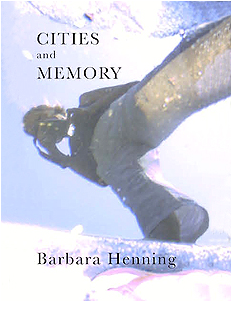Purchase:
Order directly from Amazon
Cities and Memory
“Barbara Henning’s new book brings together several years of her atonal musings on autobiography, place and longing. Lyrical bursts punctuate the narrator’s otherwise seamless restlessness–Detroit, New York, Tucson, and India. The following Escheresque lines from one of Henning’s narrators could well have been spoken by Nella Larsen’s Helga Crane: ‘Why am I here, I think, when I could be there? Because if I were there, I’d be thinking why am I here when I could be there.’ As lopsided as a grin on the edge of a nervous grimace (‘sex is an ever available age old temporary cure for sadness’), Cities and Memory is a disjunctive incarnation of a simple, profound ethos: ‘Don’t forget me, he said.’ And Henning doesn’t”
—Tyrone Williams
You are alive and then you’re not, and that’s it,” writes poet and Zen teacher Norman Fischer in a talk on Chan master Zhaozhou. “It’s so easy to forget that this is the case.” Or a little more stringently: “You and I are already dead. We think we’ll be dead later, but that’s baloney. Actually, right now in each breath we are alive and we are dead. We don’t know that and that’s why we are suffering.” In Barbara Henning’s radiant Cities and Memory doesn’t have to insist on this, or get all histrionic about it; such a sense of scale and occasion permeates everything here, the correlative lightly-worn gravitas and grandeur inhabiting even the most inconspicuous occurrence. So Cities and Memory gives us everything back, our lives in their ordinary everyday luminosity, nothing special. “Hey yoga girl!”
—Tenney Nathanson
In Barbara Henning’s Cities and Memory the quotidian choreography of a day is teeming with experiential data meshing the feelings of place, people and time. She strips away static silhouettes shadowing the backdrop of time composure and stillness are shattered as continuous reality is layered in this subtle and sustained work. As if a direct challenge to a possible outcome detailed by Michel de Certeau in The Practice of Everyday Life, “Immobile inside the train, seeing immobile things slip by. What is happening? Nothing is moving inside or outside the train.” Cities and Memory risks itself by opening up to the flood of continuum streams. These registers are edged with compassion
—Brenda Iijima.
Barbara Henning is a practitioner of the long view, a life adjacent, introjected, clad in parentheses. She writes words where they change lanes without signaling. Who she knows, what she knows, her knowing is voracious and nuanced and delicately aware. Barbara is the master of the mixed memoir. She achieves phenomenal nominal density of specification, texture. She writes the weather and the tide and she writes in what some say is an unnatural craft and she makes it seem natural.
—Erica Hunt
Barbara Henning’s new book from Chax Press, Cities and Memory, is a tremendous accomplishment. Across a range of varied projects in prose, the consistent element here is the sentence as a unit of perception used to annotate a life, or to sketch the shadows of one’s experience before they shift again. Henning’s way of playing with sentences, at times splicing together different observations from different situations, has a density and substantiveness, can feel meditative and frenetic at the same time, the way a walk through a park in the city might, the city where “Even during deepest sleep, I think I am always aware that I am almost never, except in the early morning, alone.” The city which is nevertheless, like memory, “a place where it’s not so easy to be local.” One underlying principle turns out to be an oscillation between what Stanley Cavell would call inhabitation and abandonment, raising the question of whether one can indeed live in one’s utterance or whether one is constantly being evicted from it, even by choice. Tenney Nathanson in describing this work refers to the “lightly-worn gravitas and grandeur inhabiting even the most conspicuous occurrence.” I’d heartily agree with that, and add that what I may admire most here is the amazing honesty of the details and Henning’s ability to also include all the weirdness and discomfort that we have trouble speaking about otherwise, the strangeness of all the types of encounters in the city for which we have no sufficient public language. While on the one hand the writing’s restraint is admirable, especially the way it avoids bad pathos of the self-help variety, the work nevertheless has a compelling richness and intensity that seems to call for both close listening and for active transference from the reader. Henning’s language opens up the itinerant experience of writing to declare, at the site of the sentence, “Today I like not having too many things.” And I believe her. Please welcome Barbara Henning to the EOAGH Reading Series today.
—Tim Peterson’s introduction at Unnameable Bookstore reading in March 2010.
